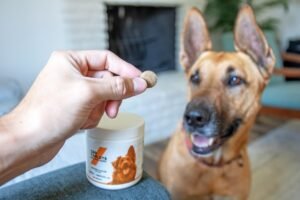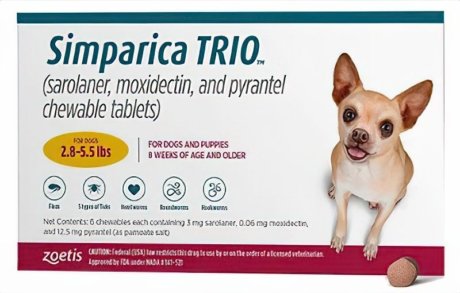Is Curd Good For Dogs? | Nutritional Value, 5 Health Risks, Types
As pet owners, we constantly strive to provide our canine companions with the best possible care and nutrition. Our pets are not just animals; they are cherished members of our families. Consequently, we are often inclined to share some of our own favourite foods with them, including curd, or yogurt. While curd boasts several health benefits for humans, it’s essential to explore whether it is equally suitable for our furry friends. In this comprehensive article, we will delve into the potential advantages and risks of incorporating curd into a dog’s diet, aiming to provide you with a detailed understanding of this topic.
Is Curd Good For Dogs?
Yes, plain and unflavored curd (yogurt) can be good for many dogs in moderation. It provides probiotics, calcium, and protein. However, some dogs are lactose intolerant, so it’s important to monitor their tolerance and consult a vet if unsure. Always offer curd as an occasional treat, not a primary food source.
It can provide some nutritional benefits for your furry friend. Here are a few things to consider:
- Probiotics: Curd contains beneficial probiotics that can help promote a healthy gut flora in dogs, just as it does in humans. This can aid in digestion and support a strong immune system.
- Calcium: Curd is a source of calcium, which is essential for maintaining healthy bones and teeth in dogs.
- Protein: It also provides a moderate amount of protein, which is important for muscle maintenance and overall health.

Benefits of Curd for Dogs:
- Probiotics: Curd is a rich source of probiotics, which are beneficial bacteria that support a healthy digestive system. These probiotics can help regulate your dog’s gut flora, aiding in digestion and nutrient absorption.
- Calcium: Curd contains calcium, an essential mineral for dogs. Calcium is vital for maintaining strong bones and teeth, especially in growing puppies and senior dogs.
- Protein: Yogurt provides a moderate amount of protein, which is necessary for muscle maintenance, tissue repair, and overall canine health.
Considerations When Feeding Curd to Dogs:
- Lactose Intolerance: One of the primary concerns when feeding curd to dogs is lactose intolerance. Many dogs, like some humans, have difficulty digesting lactose, a sugar found in milk and dairy products. Lactose intolerance can lead to digestive issues such as diarrhea, gas, and abdominal discomfort. It’s essential to monitor your dog for any signs of lactose intolerance, especially if they haven’t consumed dairy before.
- Plain, Unflavored Curd: When offering curd to your dog, always choose plain, unflavored yogurt without any additives. Flavored yogurts often contain added sugars and artificial sweeteners, which are not suitable for dogs.
- Moderation: As with any treat or addition to your dog’s diet, moderation is key. A small amount of plain yogurt as an occasional treat should be sufficient. Overfeeding curd can lead to excessive calorie intake, which might contribute to weight gain.
- Consult Your Veterinarian: If you’re uncertain about whether curd is suitable for your specific dog or if your dog has any dietary restrictions or health concerns, it’s crucial to consult your veterinarian. They can provide personalized advice based on your dog’s unique needs.
How to Introduce Curd to Your Dog:
- Start with a small amount, such as a teaspoon or two, to see how your dog reacts.
- Observe your dog for any signs of digestive upset, like diarrhea or gas, after consuming curd. If they tolerate it well, you can gradually increase the amount if desired.
- Remember that curd should be offered as an occasional treat, not a primary food source. It should complement your dog’s regular, balanced diet.
Is Curd Rice Good For Dogs?
Yes, curd rice, when prepared with plain and unflavored ingredients, can be offered to some dogs in moderation as an occasional treat, providing probiotics and potential ease of digestion. However, it should not replace their regular balanced diet, and monitoring for individual tolerance is essential, especially for dogs with lactose intolerance. Consulting a vet is advised if uncertain.

Curd rice, a popular dish in some cultures, is a combination of cooked rice and yogurt (curd). When it comes to feeding curd rice to dogs, it’s important to consider a few factors:
1. Lactose Intolerance:
Like curd alone, curd rice contains dairy products, which can be problematic for dogs with lactose intolerance. Lactose is the sugar found in dairy, and many dogs lack the enzyme needed to digest it properly. Feeding lactose-containing foods, like curd rice, to lactose-intolerant dogs can lead to gastrointestinal upset, including diarrhea and gas.
2. Rice Content:
Rice is generally considered safe for dogs and is often used as a bland diet for digestive upset. However, the rice should be plain, without any added ingredients like spices, salt, or seasonings.
3. Portion Size:
If you decide to feed a small amount of plain curd rice to your dog as an occasional treat or for a specific purpose (such as a bland diet for an upset stomach), it’s crucial to keep the portion size small and monitor your dog’s reaction closely.
4. Individual Tolerance:
Every dog is unique, and their tolerance to certain foods can vary. Some dogs may be able to handle small amounts of curd rice without issue, while others may experience digestive discomfort.
5. Consult Your Veterinarian:
Before adding any new food to your dog’s diet, including curd rice, it’s always a good practice to consult with your veterinarian. They can provide personalized advice based on your dog’s specific dietary needs and any existing health conditions.
The Nutritional Composition of Curd
Before we dive into whether curd is a wise dietary choice for dogs, let’s take a closer look at its nutritional profile. Curd is renowned for its rich nutrient content, including protein, calcium, probiotics, vitamins (such as B12 and riboflavin), and minerals. These components make curd not only delicious but also potentially beneficial for overall health.
Potential Benefits of Feeding Curd to Dogs

1. Supporting Digestive Health
One of the foremost advantages of curd is its ability to promote digestive health. The live bacterial cultures present in curd, commonly known as probiotics, can help maintain a balanced gut flora in dogs. This balance is essential for efficient digestion and the absorption of nutrients.
2. Probiotics for Canine Well-being
Curd is a natural source of probiotics, which are beneficial microorganisms that can enhance a dog’s immune system. By supporting a robust immune response, probiotics contribute to your dog’s overall well-being.
3. Strengthening Bones and Teeth
Calcium is a vital nutrient for dogs, particularly when it comes to bone and dental health. Curd is an excellent source of calcium, making it a valuable addition to the diet of growing puppies and senior dogs alike.
Risks Associated with Curd Consumption in Dogs

1. Lactose Intolerance in Dogs
While curd contains lower levels of lactose compared to milk, some dogs may still be lactose intolerant. Lactose intolerance can lead to gastrointestinal discomfort, including symptoms like diarrhea and gas, in dogs that lack the necessary enzymes to digest lactose properly.
2. The Challenge of High Fat Content
Curd can be relatively high in fat, which may not be suitable for dogs with a predisposition to obesity. Excessive fat consumption can contribute to weight gain and related health concerns, so it’s essential to be cautious about portion sizes.
Guidelines for Feeding Curd to Dogs
If you decide to include curd in your dog’s diet, it should be done thoughtfully and in moderation. Start with a small amount, such as a teaspoon, and closely monitor your dog’s reaction. Ensure that the curd is plain and unsweetened, free from any artificial additives or sweeteners.
Alternatives to Curd
For those who are uncertain about introducing curd into their dog’s diet or for dogs with known lactose intolerance, there are alternative options available. Consider plain, unsweetened, and unflavored yogurt formulated explicitly for dogs. These products are typically lactose-free or contain reduced levels of lactose, making them a safer choice.
Conclusion:
In conclusion, curd can potentially offer numerous benefits to dogs, provided they are not lactose intolerant and it is given in moderation. Nonetheless, it is crucial to consult with your veterinarian before making significant dietary changes for your furry companion. Every dog is unique, and their nutritional needs may vary.
Frequently Asked Questions:
-
Is curd safe for all dogs?
Curd may not be safe for all dogs, especially those with lactose intolerance. Consulting your veterinarian is advisable before introducing curd into your dog’s diet.
-
What is the recommended curd serving size for dogs?
Start with a small amount, such as a teaspoon, and monitor your dog’s reaction. Adjust the serving size as needed based on your dog’s individual tolerance.
-
How can I tell if my dog is lactose intolerant?
Look for signs of gastrointestinal distress after feeding curd, such as diarrhea or gas. If these symptoms occur, your dog may be lactose intolerant.
-
Are flavored yogurts suitable for dogs?
It is best to avoid flavored yogurts, as they often contain added sugars and artificial ingredients that are not suitable for dogs.
-
Can curd improve a dog’s breath odor?
While the probiotics in curd may contribute to better oral health, it is not a guaranteed solution for bad breath. Regular dental care, including brushing and dental treats, remains essential for your dog’s oral hygiene.
-
Can curd help with my dog’s upset stomach?
Curd’s probiotic properties may aid in soothing a mild upset stomach in dogs. However, if your dog’s stomach issues persist or worsen, consult with your veterinarian for appropriate treatment.
-
Are there specific curd brands that are better for dogs?
While plain and unsweetened curd is generally safe for dogs, some brands may be better suited due to their lower lactose content. Consult your vet or consider dog-specific yogurt brands to ensure safety.
-
Can curd be used as a training treat for dogs?
Yes, curd can serve as a healthy training treat for dogs, provided they enjoy its taste. It’s a great alternative to commercial treats, but remember to use it in moderation to maintain a balanced diet.
-
Is Greek yogurt a better option than regular curd for dogs?
Greek yogurt often has lower lactose content than regular curd, making it a potentially better option for dogs with lactose intolerance. However, it’s essential to check the label for any additives or sweeteners.
-
Can curd be included in homemade dog food recipes?
Yes, you can incorporate curd into homemade dog food recipes to enhance their nutritional value. Be sure to follow balanced recipes and consult with a veterinarian or canine nutritionist to ensure proper nutrition.
-
Can curd be given to puppies, or is it only suitable for adult dogs?
Curd can be given to puppies as well as adult dogs. It can provide essential nutrients for growing puppies, but portion sizes should be adjusted according to their age and size.
-
Does curd have any benefits for senior dogs?
Yes, curd can be beneficial for senior dogs by providing easily digestible protein and calcium, which may help maintain bone health. However, consult with your veterinarian for a diet tailored to your senior dog’s specific needs.
-
Are there any homemade curd recipes for dogs?
There are various homemade curd recipes for dogs available online, such as frozen curd treats or curd mixed with dog-friendly fruits like bananas or blueberries. Ensure that the recipes align with your dog’s dietary requirements.
-
Can curd be used to mask the taste of medication for dogs?
Yes, some dogs may find curd’s taste appealing, making it a useful tool to administer medications. However, always consult with your vet regarding medication administration for your specific dog.
-
Is curd a suitable option for dogs with allergies?
Curd is generally well-tolerated by dogs and is less likely to trigger allergies compared to other dairy products. Nevertheless, monitor your dog for any adverse reactions, especially if they have a history of food allergies.
Recommended:
Koi Fish | Prices, 12 Types, Colours, Facts, Food, Care Tips and Health Issues
Anteaters | Habitat, 6 Types, Facts, Care Tips, Food, Lifespan





























